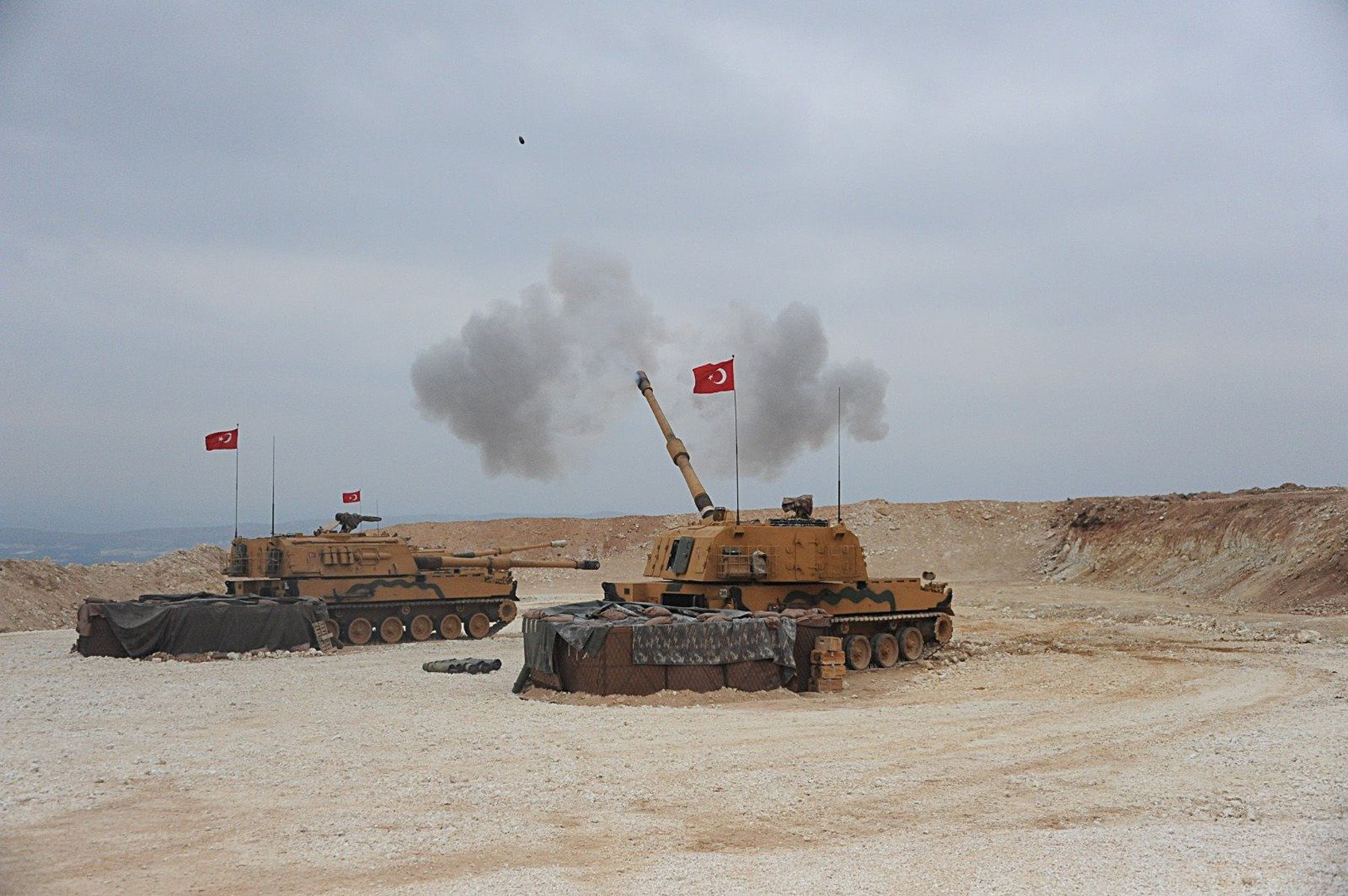
A Crisis in Turkey-U.S. Relations
Since 2013, relations between Turkey and the United States have been gradually worsening. On one hand, it stemmed from a deterioration in democracy and human rights in Turkey and criticism on that matter voiced by the United States, while on the other, growing discrepancies towards the Syrian civil war. The differences became palpable in August/September 2013 after signs that Bashar al-Assad’s regime had crossed then-U.S. President Barack Obama’s “red line” of using chemical weapons in the conflict. The president had declared the United States would consider military engagement if they were used. Turks, who had been hoping for Assad’s overthrow for a long time, were persuading Obama to take a firm stance on that matter. In the end, however, Obama decided against the use of force.
Another deterioration in Turkey-U.S. relations happened in the second half of 2015, when the peace process between the Turkish government and Kurdistan Workers Party (PKK)—considered a terrorist organisation by Turkey, the U.S. and EU—stopped. The U.S., meanwhile, was cooperating with the Kurdish Democratic Union Party (PYD) on Syrian soil, but since the PYD is tied to the PKK, Turkey considers it to be the PKK’s Syrian branch. The cooperation between the U.S. and the PYD brought about many charges by Turkish decision-makers of a lack of support from their Western allies in the fight with terrorism. Furthermore, the Turkish authorities were afraid that the U.S. was seeking to create an independent or autonomous Kurdistan in northern Syria. The Turks consider that notion to be an existential threat because it may influence separatist Kurdish tendencies in Turkey’s northeast region, where the PKK is very active.
The failed 15 July coup in Turkey became another problem in its relations with the U.S. The Turkish government intensified its demands to extradite Fethullah Gülen, a Muslim cleric who has been living in the United States since 1999, accusing him of organising the attempted military overthrow. Moreover, Turkish politicians extensively used anti-American rhetoric, suggesting even that the U.S. had supported the coup attempt (voiced by Süleyman Soylu, currently serving as Turkey’s Minister of the Interior, among others). The U.S. government, in turn, criticised Turkish President Recep Tayyip Erdoğan for the broad repressive measures he undertook following the failed coup. At the same time, worries have increased in the U.S. concerning Turkey’s Russia rapprochement and, in essence, by the two countries’ cooperation on Syrian territory.
On the Road to Better Relations
During her presidential campaign, former U.S. Secretary of State Hillary Clinton spoke about the possibility to directly arm Syrian Kurds to improve the fight against the Islamic State (IS). In Turkey, this idea was perceived as a sign of her willingness to continue the Obama policy. Thus, the election of Donald Trump was welcomed with pleasure by Turkish authorities even though he had not openly declared intent to depart from his predecessor’s actions in that area.
Those authorities hope that during Trump’s presidency the Turkish-American alliance will be rebuilt. In their opinion, both heads of state have a similar leadership style and the conviction that this American president will not pay as much attention to democracy and human rights may serve this aim. What is more, Turkey’s politicians count on goodwill with the new U.S. administration on the Gülen extradition issue. Above all, however, they want the Trump team’s openness on Turkey’s plans concerning the Syrian civil war. They expect the U.S. will end its cooperation with the Syrian Democratic Forces (SDF), a multi-ethnic alliance dominated by the PYD’s armed force. They argue the U.S. should collaborate with Turkey and the Turkey-backed Syrian opposition instead.
Recent heavy diplomatic traffic between the two states suggests that the U.S. also seeks to improve relations. In February alone, after a phone call between the two presidents, there were discussions between the foreign affairs and defence staffs, the presidents’ chiefs of staff and a meeting between U.S. Vice President Mike Pence and Turkish Prime Minister Binali Yıldırım. Ankara also received visits by CIA chief Mike Pompeo, as well as U.S. Senator John McCain, who is the chair of the Senate Armed Services Committee. During these meetings, the Turks tried to persuade their American partners to their ideas on the Syrian civil war. They presented them with their plans to retake Raqqa, considered the “capital” of IS in Syria. Although the substance of the plan was not publicly revealed, Turkish media claimed that the country’s authorities want to launch the offensive from Tell Abyad in northern Syria. If so, the army would move through PYD-controlled territory, and this would harm cooperation between the U.S. and the PYD on the east side of the Euphrates.
During the consultations, representatives of the U.S. administration reportedly avoided clear answers on whether they support the Turkish plans in Syria. James Mattis, the U.S. Secretary of Defense, has been given until 28 February to present President Trump with a renewed strategy in the fight against IS. The report has not been made public yet, but from Mattis’ earlier statements, one can envision it includes a broad set of measures aimed at speeding up the process of eradicating IS.
Prospects
Trump, who has repeatedly declared the aim to speed up the fight with IS, probably will not choose measures completely cohesive to the Turkish plans. Under the current circumstances, based on the location and number of units, going forward with the Raqqa offensive with only Turkey and Turkey-backed opposition troops probably would mean eradication of IS would take a while. Trump may be rather prone to continuing the fight with IS in Syria, especially in terms of the Raqqa offensive, in cooperation with the SDF (the Pentagon is said to prefer that option). That decision, though, may entail a huge cost. On the military front, it would probably ensure a Turkish response, with some politicians already declaring that such scenarios may endanger the country’s interests and that it may force Turkish forces to attack the Syrian city of Manbij, which has been under SDF control (although carrying out this threat was made harder after the U.S. sent a small number of troops to the city in the first half of March and would be even harder if one day Manbij returns to Assad regime control). The Turks also said they would consider closing Incirlik air base, used by the Americans to bomb IS and carry out key missions throughout the region. Either measure would seriously complicate the fight with IS. While the first one would draw away SDF attention from Raqqa and force some of its troops to defend the city, the second would cut the anti-IS coalition off from a very advantageous air base. In the longer-term perspective, the U.S.-SDF cooperation, which itself wholly disregards the interests of the Americans’ Turkish allies, may have serious political consequences. Probably such a turn of events would strengthen anti-Western sentiments in Turkey and result in weaker engagement of the country in NATO. Turkish politicians have already suggested that possibility to their American counterparts, with claims that they are seriously considering buying the Russian-made S-400 missile system. Carrying out this threat would be a serious disadvantage to the Alliance because it would diminish the possibility of cooperation between Turkey and the U.S./NATO on missile defence.
Thus, it is possible that the American administration will try to find a compromise covering both its cooperation in Syria with SDF and a response to Turkey’s concerns. There are some signs of that search, including assurances that the new administration aims to give Turkey more support in its fight against the PKK. One key measure from the Turkish point of view is pressure on the PKK to limit its activity in Sinjar, an Iraqi province near the border with Turkey. The U.S. may also decide to continue the Raqqa offensive in cooperation with the SDF but later include some Turkey-tied groups in the process of governing the city. That solution would be rational from the perspective of the city’s longer-term stabilisation, since it is inhabited mainly by Sunnis. One may also expect that, simultaneously, the U.S. would exert pressure on the Turkish government and the PKK to renew the peace process. Reaching that aim would greatly make the U.S. fight against IS easier because it would diminish the negative effects of its political and military choices on its relations with Turkey. Yet, renewing the Turkey-PKK peace process is highly improbable until after the constitutional referendum that will take place in Turkey on 16 April.
Coordination of plans concerning the Syrian civil war will be another test for Turkey-U.S. relations. If the two allies can reach compromise, their relations are highly likely to improve. Otherwise, they will continue to be plagued by these problems. Poland’s government should carefully observe the reshaping of Turkey-U.S. relations because of the importance to Poland’s security. Diminished Turkish engagement in NATO because of the friction in relations with the U.S. would negatively affect the effectiveness of the Alliance’s deterrence policy towards Russia. Furthermore, in the longer term, the poorer relations with the U.S. may result in further weakening of Euro-Atlantic trends in Turkey.







